Causing Death by Rash Driving: Maximum 5 years' jail
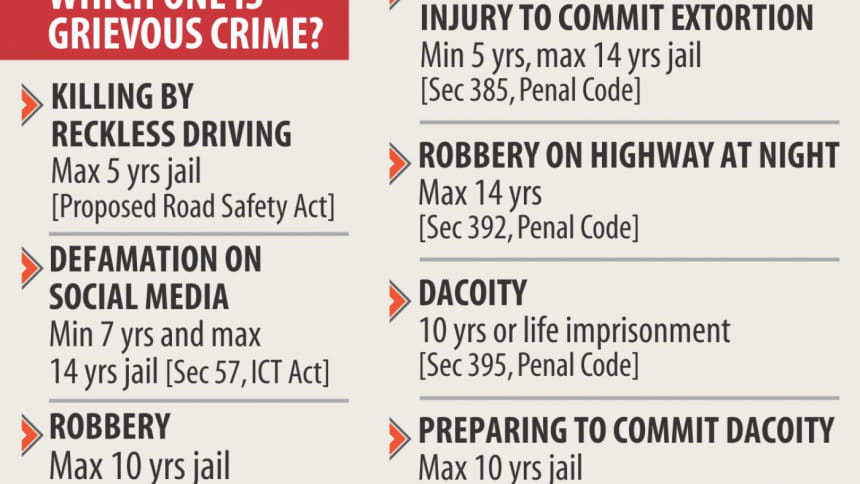
A draft law approved by the cabinet yesterday proposes a maximum punishment of five years' imprisonment for causing death to a person by reckless driving, drawing strong criticism from road safety campaigners who termed the sentence insufficient to end anarchy on roads.
The cabinet at its regular weekly meeting gave the final approval to the proposed law amid an unprecedented student agitation for road safety. Prime Minister Sheikh Hasina chaired the meeting at the secretariat.
Later, Cabinet Secretary Mohammad Shafiul Alam briefed the media about different aspects of the proposed law, and said if the draft law is passed by parliament and is implemented properly, that would be good for all.
The draft also proposed increasing the punishment for driving unregistered and unfit vehicles and for driving without licence and route permit.
It also suggested that the number of vehicles be regulated in certain areas and funds be set up for treatment of the injured in road accidents and compensation for the victims' families.
In March last year, the cabinet approved in principle the proposed legislation -- Road Transport Act -- but it remained shelved at the law ministry for more than a year for vetting amid opposition of transport owners and workers to some of its provisions.
But the government last week decided to place the draft act before the cabinet amid student agitation for road safety following the death of two college students in the capital on July 29.
Thirty-three years ago, the maximum punishment for causing death by reckless and negligent driving was a jail term of seven years. But in the face of truckers' protests in 1985, the Ershad government reduced the term of imprisonment to three years by amending the Penal Code.
Anguished over growing incidents of reckless driving, road safety campaigners have long been demanding that the government increase the punishment to at least 10 years for causing death to a person by rash driving.
Following a writ petition that challenged the 1985 amendment, the High Court in a 2014 verdict declared void the amendment that reduced the jail term.
"Reducing the penalty of such a crime [causing death by reckless driving] resulting in death to others is disproportionate and unreasonable to the offence,” the HC observed.
"Moreover, by reducing the term of imprisonment for the offence, the government is indirectly inducing people to be more careless by which the government is violating the 'right to life' of the citizens as guaranteed by the constitution under fundamental rights, which is ultra vires and illegal."
There can be no reasonable ground to reduce the penalty for this severe offence. "In fact, seven years' imprisonment as punishment or sentence is also insufficient for causing death of a person by reckless and negligent driving," observed the HC.
Manzil Murshid, who was a counsel for the petitioners, said yesterday that the Penal Code provision, which had stipulated a maximum jail term of seven years, was restored as the HC declared void the amendment that reduced the sentence to three years.
In his view, the punishment for causing death to a person by reckless driving is up to seven years or a fine or both under section 304B of the Penal Code.
The relevant provision of the proposed law approved by the cabinet yesterday, however, says the maximum punishment for causing death or injury to a person by reckless driving is five years' imprisonment or fine or both.
Section 304B of the Penal Code will not be applicable to try offenders for reckless driving, according to the draft.
On August 1, Road Transport and Bridges Minister Obaidul Quader said the draft law would be placed in parliament for passage in its next session after the cabinet's approval.
PUNISHMENT FOR RECKLESS DRIVING
Section 103 of the proposed law says no matter what this act contains, if anybody gets seriously injured or killed in a motor vehicle-related accident, it would be considered as an offence under the relevant sections of the Penal Code, 1860.
However, no matter what section 304B of the Penal Code contains, if anybody causes accident by reckless and negligent driving, and kills or injures someone severely, such person would face a maximum sentence of five years in jail or a fine or both, reads the draft.
The offences that fall under section 103 of the draft act are non-bailable.
Law Minister Anisul Huq said if it is found that a driver has deliberately committed a killing or has not averted a killing in a road accident, the matter would not fall under the purview of section 103 of the draft act. It will fall under either section 302 or 304 of the Penal Code.
The minister, however, pointed out that law enforcement agencies will decide on it upon investigation.
The maximum punishment under section 302 of the Penal Code is death penalty while it is life imprisonment under section 304.
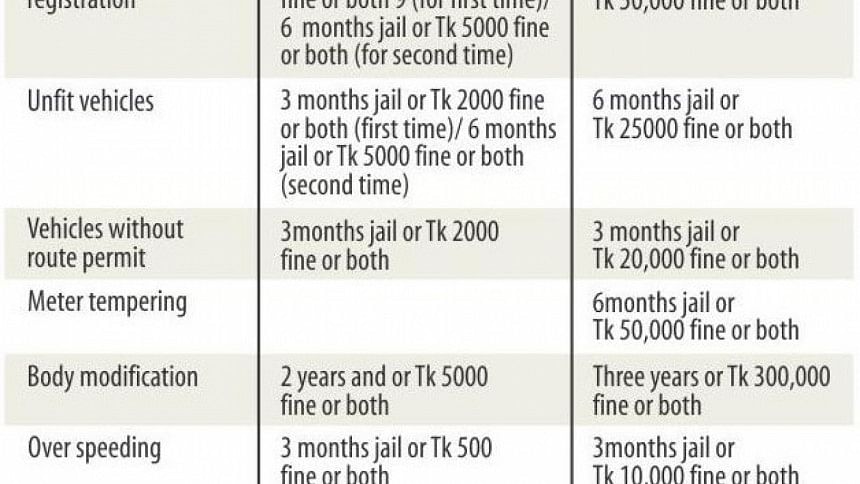
OTHER PROVISIONS
As per the draft law, drivers must have education not below eighth grade, and nobody will be allowed to drive vehicles without licence, said the cabinet secretary.
A person must be at least 18 to get a driving licence and 21 to get a professional licence. It will be mandatory for anyone to have a licence to be a conductor of a vehicle, he said.
As seen in the developed countries, the draft has a provision of keeping 12 points for a driver. And the driver will lose points for committing offences. When the points come down to zero, the driver's licence will be cancelled, he added.
According to the draft, a driver will lose points for nine types of offenses, including drunk driving, illegal overtaking, reckless and dangerous driving, and violation of traffic signals and speed limits.
No vehicle owner can hire a driver without driving licence, and no one is allowed to drive public service vehicles without permission from the authorities concerned, it says.
The government, through gazette notifications, can regulate the number of motor vehicles for a person, family, organisation and also for a certain area. It can also set working hours for drivers, conductors, helpers and other staffers in line with the labour law. The owners and recruiting authorities must follow those, the draft mentions.
As per the draft law, 22 types of directives must be followed to drive motor vehicles, and a person may face imprisonment up to three months for violating those.
ACTION AGAINST GOVT OFFICIALS
Action can be taken against any government official under the existing law if his or her negligence or fault causes an accident, reads the draft.
If any accident occurs due to faults in design or manufacturing or maintenance, the construction firm, the maintenance authorities and assigned persons will be held responsible, and action can be taken against them as per the existing law, it adds.
FUNDS FOR VICTIMS
The government will raise funds for the injured or family members of those killed in road accidents. The funds will be overseen by a trustee board with representatives from different government agencies, highway police and organisations of transport owners and workers.
The funds will be raised with contribution from the government, transport owners and workers, and a portion of fines realised from the offenders.
Usually, it takes quite a long time for the victims or their families to get insurance claims. These funds will help them in the meantime, Nazrul Islam, secretary of the Road Transport and Highway Division, told reporters at his office.
“We have increased the range of punishment and fine … leaders of both transport owners and workers agreed on the draft. The success of the law will hinge on the implementation,” he said.
Reactions
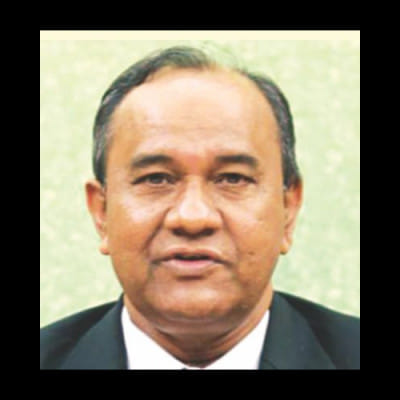
Manzil Murshed
President of Human Rights and Peace for Bangladesh
The proposed road transport act did not reflect the court order and observation as the court, in its order in 2014, said seven years of jail for reckless driving is not enough and it should be increased.
“But it was reduced to five years. The draft reflects the bus owners and workers will.”
The lawyer also said that the government drafted the law considering the reactions of transport owners and workers.
“But I think when the bill will be placed in parliament; the lawmakers will examine the loopholes and will increase the punishment.”
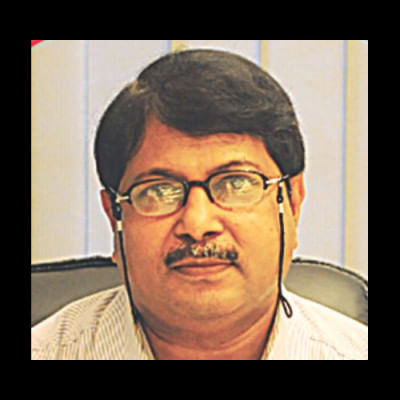
Dr Md Shamsul Haque
Former Director of Accident Research Institute, BUET
Experts want exemplary punishment for those responsible for road crashes, but the draft of the proposed road transport act did not reflect this.
“If the proposed law is passed in parliament, road safety will not be ensured for a longer time. The government has drafted the law and I think now it should insert the views of all stakeholders to make the law time befitting and longstanding.”
He also said if all the punishment is only ensured for drivers, it will not help ensure road safety.
“The law must hold responsible all the stakeholders for road crashes, starting from the owners to the engineers.”
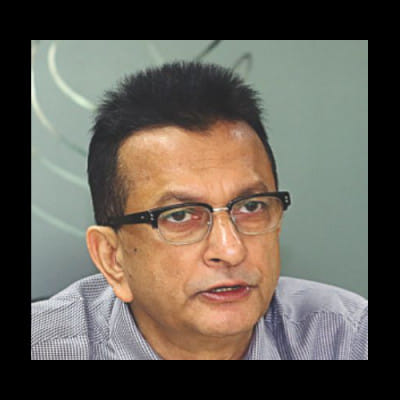
Khondaker Enayet Ullah
Secretary General, Bangladesh Road Transport Owners Association
“I think the owners and workers will not have much to say about the act. It is a time befitting one.”
He also, however, said that it would not be possible to reduce road crashes by only increasing the fine and penalty.
“There are many other issues related to a road crash. To ensure road safety and reduce road crash, those issues have to be addressed. Otherwise the act would not bring any good result for us.”
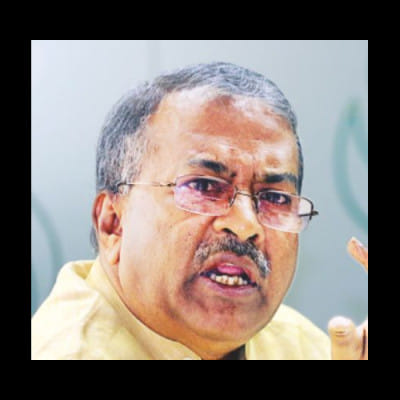
Osman Ali
General Secretary, Bangladesh Road Transport Workers Federation
The draft has some good sides as punishments were increased from three years to five years and it is logical.
But the provision of having mandatory education up to Class VIII to obtain a driving licence will encourage the corruption, he said.
“Where will the drivers get the certificate? There is a shortage of legal drivers and this process with lengthen the time for a driver to get legal driving license,” the labour leader said.
Osman also said the government has to take initiatives to establish driving schools in all 64 districts, regular training facilities for drivers, and markets and schools should be removed from the highway. Many other steps have to be taken to reduce road crash.
“If these are not addressed properly, it will not be possible to implement the proposed law.”

Ilias Kanchan
Chairperson, Nirapad Sarak Chai (We Want Safe Roads) movement
Experts and activists had suggested that a committee be formed comprising secretaries of the Prime Minister's Office and other ministries so that issues relevant to different ministries were dealt with in a coordinated manner.
“No recommendations had been accepted and accommodated into the draft law placed in the cabinet yesterday,” he said.
He added that the issue of compensating victims was also kept vague. The committee to decide compensation will be comprised of representatives from drivers', workers' associations and from the government.
“The law will not require anyone involved in the safe road movement to be in the committee to see if victims are getting justice and adequate compensations,” Ilias elaborated.

 For all latest news, follow The Daily Star's Google News channel.
For all latest news, follow The Daily Star's Google News channel. 


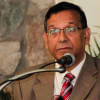






Comments